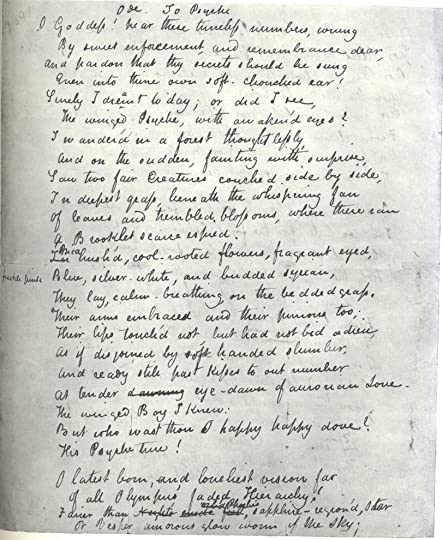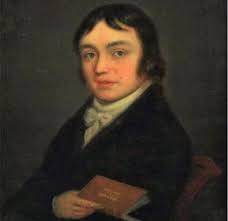The Keats-Shelley Synchronised Reading Group meets for 30 minutes once a week to read a poem or short prose passage - together and alone, from the safety and isolation of our homes. Over the past seven weeks, readers from Istanbul to Sweden, Rome to Mexico have read together in time if not in space, without any need for Zoom meetings or Skype hangouts.
The idea of community through simultaneous reading was suggested by John Keats himself. In December 1818 he wrote from London to his brother George and Georgiana Keats in Kentucky:
‘I shall read a passage of Shakespeare every Sunday at ten oClock – you read one at the same time and we shall be as near each other as blind bodies can be in the same room.’
This month, the texts celebrate Keats' great May Odes of 1819. Last week, we read Ode on Indolence. A couple of weeks before that it was Ode to a Nightingale.
Week 7 we are reading Ode to Psyche - often assumed to be the first Ode Keats composed, through the running order is a matter of speculation and debate. As a side-order, we will also peek at Coleridge's knowing short poem of the same name, albeit a 'Psyche' of a different stripe.
We will begin our reading at 2pm GMT on Wednesday 13th May. If work, family or time zones make this difficult - John and George would have been four hours apart - read at your own 2pm. Or whenever you can - the important part is the reading, and the community of readers united by books and the imagination.
We would love to hear where in the world you are reading. If you want to send us a video or recording of your reading - or your thoughts and feelings - please do so. Get in touch on Twitter or Facebook. You can email us too: ksmafriends@hotmail.com.
Find the texts by scrolling down.

Ode to Psyche
O Goddess! hear these tuneless numbers, wrung
By sweet enforcement and remembrance dear,
And pardon that thy secrets should be sung
Even into thine own soft-conched ear:
Surely I dreamt to-day, or did I see
The winged Psyche with awaken'd eyes?
I wander'd in a forest thoughtlessly,
And, on the sudden, fainting with surprise,
Saw two fair creatures, couched side by side
In deepest grass, beneath the whisp'ring roof
Of leaves and trembled blossoms, where there ran
A brooklet, scarce espied:
Mid hush'd, cool-rooted flowers, fragrant-eyed,
Blue, silver-white, and budded Tyrian,
They lay calm-breathing, on the bedded grass;
Their arms embraced, and their pinions too;
Their lips touch'd not, but had not bade adieu,
As if disjoined by soft-handed slumber,
And ready still past kisses to outnumber
At tender eye-dawn of aurorean love:
The winged boy I knew;
But who wast thou, O happy, happy dove?
His Psyche true!
O latest born and loveliest vision far
Of all Olympus' faded hierarchy!
Fairer than Phoebe's sapphire-region'd star,
Or Vesper, amorous glow-worm of the sky;
Fairer than these, though temple thou hast none,
Nor altar heap'd with flowers;
Nor virgin-choir to make delicious moan
Upon the midnight hours;
No voice, no lute, no pipe, no incense sweet
From chain-swung censer teeming;
No shrine, no grove, no oracle, no heat
Of pale-mouth'd prophet dreaming.
O brightest! though too late for antique vows,
Too, too late for the fond believing lyre,
When holy were the haunted forest boughs,
Holy the air, the water, and the fire;
Yet even in these days so far retir'd
From happy pieties, thy lucent fans,
Fluttering among the faint Olympians,
I see, and sing, by my own eyes inspir'd.
So let me be thy choir, and make a moan
Upon the midnight hours;
Thy voice, thy lute, thy pipe, thy incense sweet
From swinged censer teeming;
Thy shrine, thy grove, thy oracle, thy heat
Of pale-mouth'd prophet dreaming.
Yes, I will be thy priest, and build a fane
In some untrodden region of my mind,
Where branched thoughts, new grown with pleasant pain,
Instead of pines shall murmur in the wind:
Far, far around shall those dark-cluster'd trees
Fledge the wild-ridged mountains steep by steep;
And there by zephyrs, streams, and birds, and bees,
The moss-lain Dryads shall be lull'd to sleep;
And in the midst of this wide quietness
A rosy sanctuary will I dress
With the wreath'd trellis of a working brain,
With buds, and bells, and stars without a name,
With all the gardener Fancy e'er could feign,
Who breeding flowers, will never breed the same:
And there shall be for thee all soft delight
That shadowy thought can win,
A bright torch, and a casement ope at night,
To let the warm Love in!
John Keats

Psyche
The butterfly the ancient Grecians made
The soul's fair emblem, and its only name –
But of the soul, escaped the slavish trade
Of mortal life! – For in this earthly frame
Ours is the reptile's lot, much toil, much blame,
Manifold motions making little speed,
And to deform and kill the things whereon we feed.
Samuel Taylor Coleridge
We will post next week's texts on our Blog. We hope to see you - in our mind's eye at least - at 2pm on Wednesday.
James Kidd